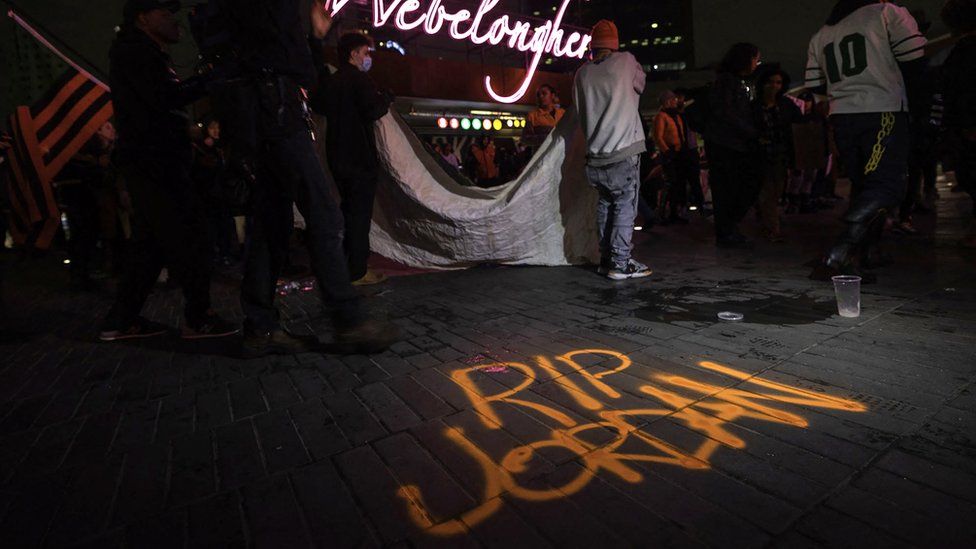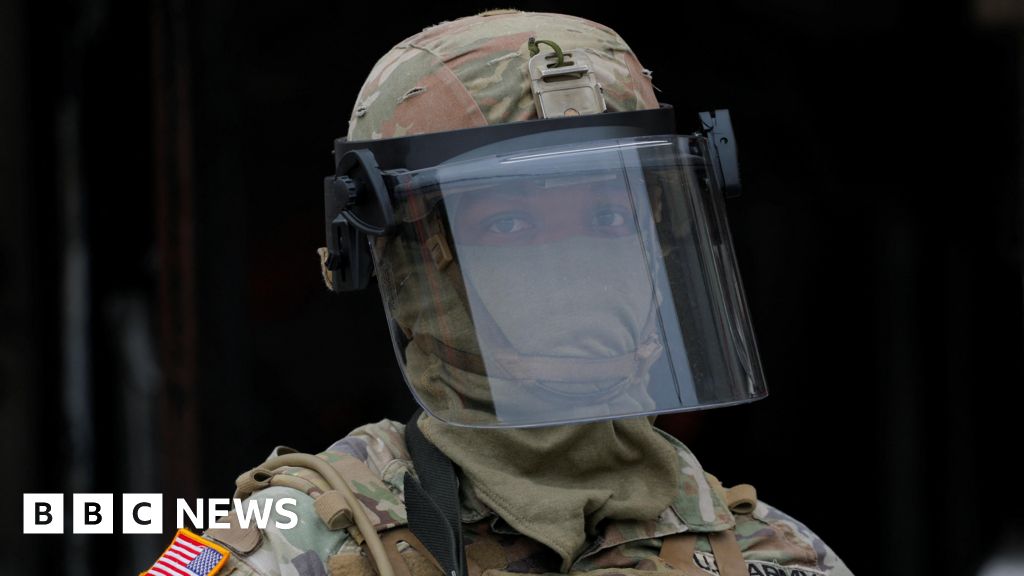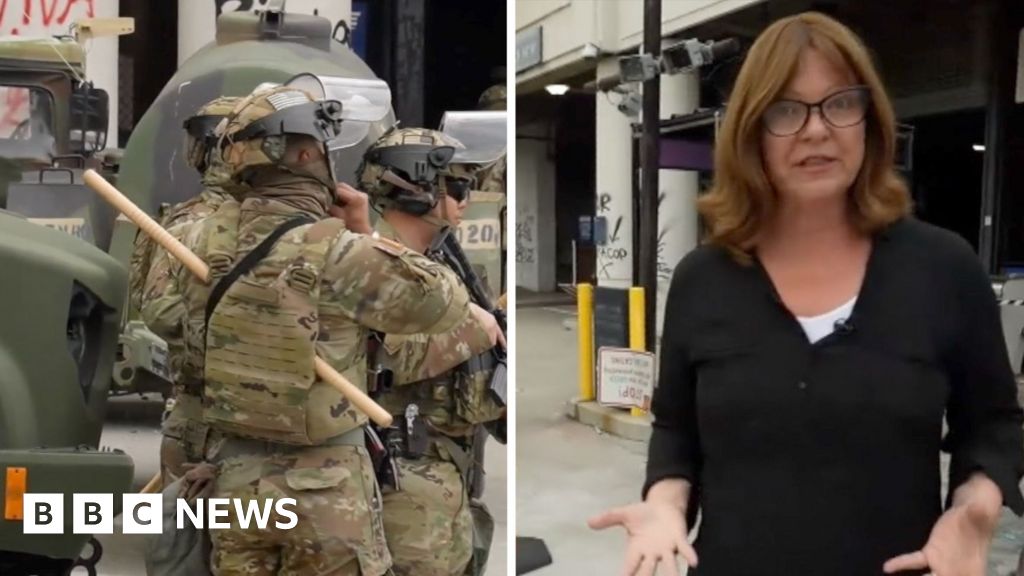ARTICLE AD BOX
 Image source, Alex Kent/AFP via Getty Images
Image source, Alex Kent/AFP via Getty Images
Protests for Jordan Neely have been held this week in New York City
By Kayla Epstein
BBC News, New York
Days after a subway passenger killed a homeless man on the New York City subway, there was little sign of what had happened in the underground station where the fatal confrontation ended.
Only a scribble of graffiti in black ink, reading "Rest in power, Jordan Neely" gives any indication of what had transpired on Monday. But above ground, his story is sparking a heated conversation around homelessness and the city's ability to protect its most vulnerable residents.
The 30-year-old's personal story suggests a series of failures in the system for dealing with homeless people in New York City, advocates say.
They cite a lack of mental health support and housing resources, and a dearth of professionals deployed to provide direct, experienced aid to people in distress.
New York state senator Jabari Brisport, a Democrat, believes "there are people all across the income spectrum who are in need of" mental health services.
"Those who can afford it get it, but those who cannot afford it end up the victims of violent individuals who decide to respond to an interaction on the subway with a chokehold," he said.
Homelessness is one of the city's most intractable issues. Nearly 69,000 people were homeless in New York City as of December 2022, according to the Coalition for the Homeless.
That is despite the city's Department of Homeless Services having a budget of $2.2bn (£1.74bn) this fiscal year alone.
New York City has resources to help people experiencing homelessness, including a housing voucher system, a right-to-shelter law, and multiple non-profits geared at helping people find housing, jobs, and treatment.
The city has also launched a pilot mental health response force, B-HEARD, and in March the mayor announced a sweeping mental health agenda.
Yet every day, tens of thousands of people struggle to obtain lodging, food, and social services. Many of them, like Mr Neely, end up seeking shelter or aid on the subway as a last-resort refuge that can sometimes lead to uncomfortable encounters with commuters.
Image source, Kayla Epstein/BBC News
Image caption,There was little sign of what happened in the underground station where the fatal confrontation ended
On 1 May, Mr Neely was killed on a northbound F train by another passenger, who put him in a chokehold during an altercation.
A video taken by bystander and journalist, Juan Alberto Vazquez, begins as the confrontation is already under way. The full sequence of events is unclear and police continue to investigate.
Mr Vazquez, told several outlets that, before the incident began, Mr Neely was shouting about being hungry and thirsty. Police sources also told CBS News that Mr Neely was allegedly acting erratically and throwing trash.
At some point, a fight began between Mr Neely and another passenger.
A video shared by Mr Vazquez shows the a passenger, later identified by police as a 24-year-old US Marine Corps veteran who they have not named publicly, putting Mr Neely in a chokehold. The two struggled on the floor and other passengers also attempt to restrain Mr Neely.
Mr Neely slowly stops moving, and was later pronounced dead at a hospital.
The New York City medical examiner ruled Mr Neely's death a homicide that resulted from "compression of [the] neck". The 24-year-old passenger was questioned by police and has not been charged.
The Manhattan district attorney's office has pledged a "rigorous ongoing investigation," a spokesman said in a statement. CBS News reported that prosecutors may convene a grand jury on the matter.
Mr Neely was a subway performer who impersonated Michael Jackson. Social media videos circulated after his death show him performing the pop star's signature moves with a beaming smile.
But his life was also marked by immense tragedy and encounters with police.
Mr Neely's mother, Christie Neely, was murdered by her boyfriend in 2007. Her murderer was sentenced to 30 years in prison in 2012, according to the Jersey Journal.
Mr Neely began experiencing mental health issues after her death, his aunt, Carolyn Neely, told the New York Post.
"He has never been the same," she said. "It had a big impact on him. He developed depression and it grew and became more serious."
She told the newspaper that Mr Neely had serious mental health conditions and it is believed he was homeless at the time he died.
He had also had dozens of encounters with the police, including 42 arrests on charges such as evading fares, theft, and unprovoked assaults on three women, CNN reported.
Image source, Gary Hershorn/Getty Images
Image caption,New York's homeless population often ends up seeking shelter or aid on the subway
Advocates for the homeless saw many missed opportunities to get Mr Neely treatment and support.
The Coalition for the Homeless condemned New York's leaders for their "complete failure to provide the critical mental health services desperately needed by so many people in our city".
Adolfo Abreu, the housing campaigns director at Vocal New York, said that Mr Neely would have faced multiple obstacles to receiving mental healthcare, housing, and food, many of them caused by policies - or lack thereof - to deal with homelessness.
"We've advanced policies that are built towards erasing, criminalizing, and institutionalising homelessness, instead of compassion," he said.
A lack of affordable housing has charged New York's homeless crisis and shows no signs of abating. The average monthly rent for a one-bedroom apartment rocketed to $3,795 in April, according to Zumper.
Mr Neely's story has also revealed a divide between New York's Democratic leaders and voices further to the left, progressives, who call for different approaches to homelessness and public safety.
New York City mayor Eric Adams, and New York Governor Kathy Hochul, have sought to address rising crime on the subways and a general atmosphere of rider mistrust by drastically increasing the presence of police.
They announced a Subway Safety Plan in February 2022 and a surge in police presence.
Part of their plan included more mental health professionals and resources to help homeless people sheltering in the subway. But the most visible result of their plans has thus far been an increased number of police in the subway system.
'Cops, cameras, care'
Ms Hochul said in February that the strategy of "cops, cameras, and care will crack down on subway crime, help those experiencing homelessness get the support they need to get out of the system, and alleviate concerns of riders to ensure New Yorkers feel safer throughout the subway system".
Mr Adams said that it was "cruel and inhumane to allow unhoused people to live on the subway, and unfair to paying passengers and transit workers who deserve a clean, orderly, and safe environment".
Progressives and advocates for the homeless, however, believe that linking homelessness to crime only further stigmatises a vulnerable population.
They have called for a surge in social workers trained to help the homeless, rather than police, as the solution.
Of Mr Neely's death, Mr Brisport, the state senator, said that "we have the money to pay a cop, or cops, to arrest him repeatedly, but not the money that can make sure he eats, shows extremely misplaced priorities".
While the debate over the appropriate approach to homelessness in the city continues, on one point most New Yorkers could agree: the system failed Mr Neely.
"Jordan deserves justice," his aunt, Carolyn Neely, said in a statement to the BBC. "He was loved."

 2 years ago
53
2 years ago
53








 English (US) ·
English (US) ·